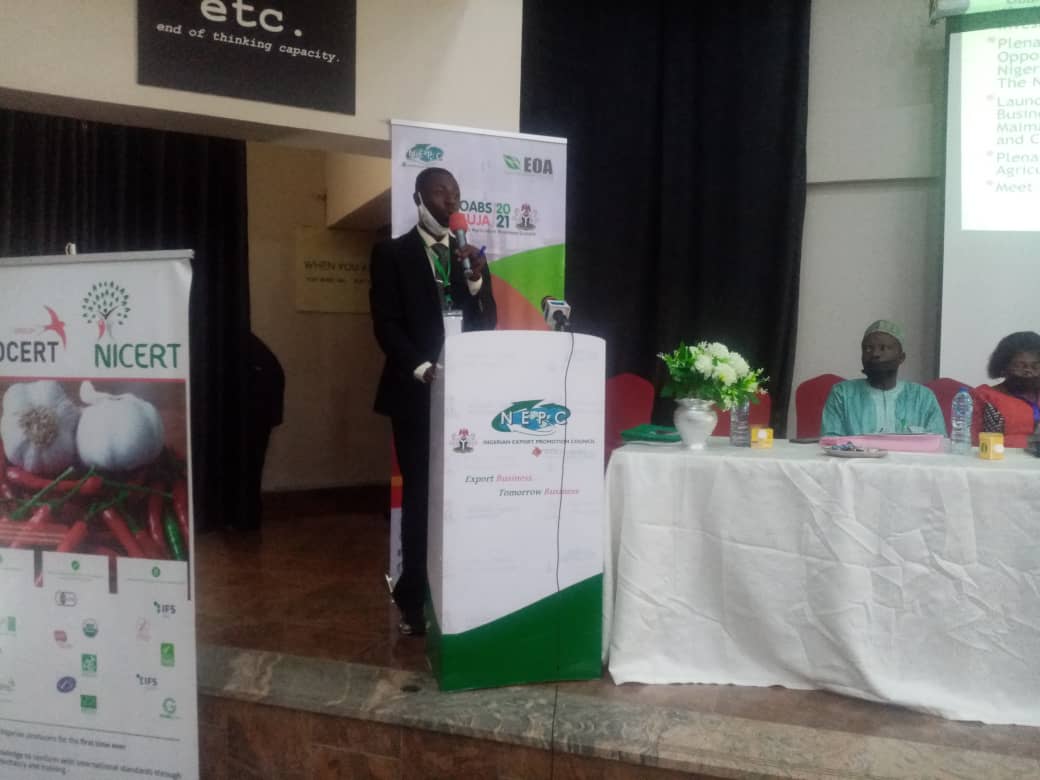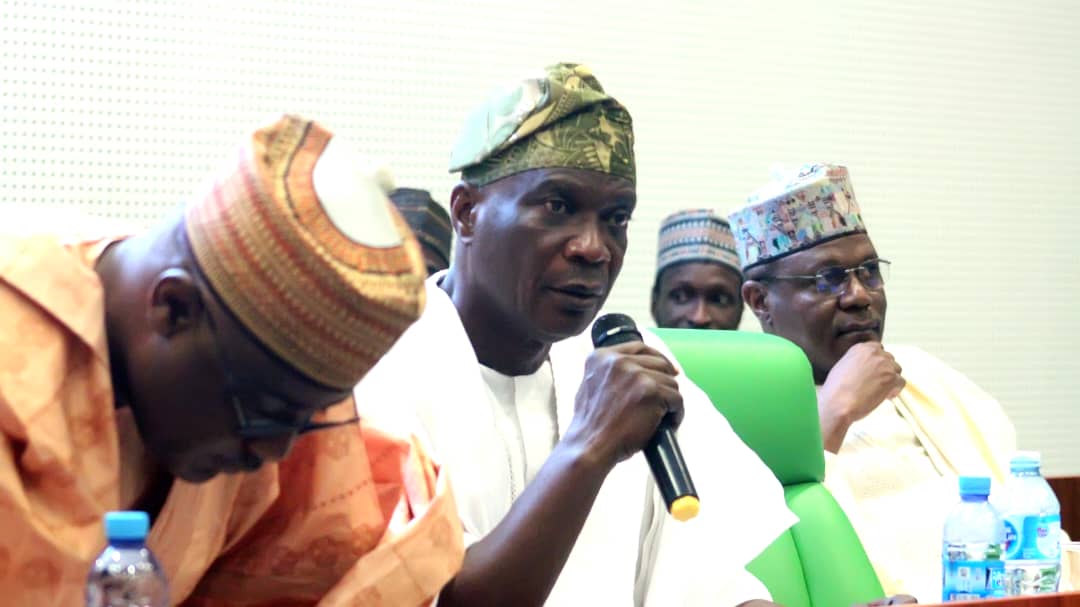Agriculture
Organic Market Value To hits $150bn In 5 Years Globally If…… NEPC

… As Organic Agriculture Business Summit kick off in Abuja
Joel Ajayi
Executive Director of National Export Promotion Council NEPC, Olusegun Arowolo has said the global value of organic market will hit $150 billion in the next five year, if necessary attention, awareness is given to Ecological Organic Agriculture.

Arowolo who was represented by Mr Williams Ezeagu stated this on Tuesday, in Abuja at the National Organic Agriculture Business Summit NOABS 2021.
He expressed that organic certified foods will reduce the negative impact of inorganic on both human animal.
According to him, recently the action plan under the world food summit identifies the importance of organic input technologies farming techniques and other sustainable methods in organic farming.
“With the negative effect of covid – 19 Pandemic, increasing awareness of healthy food consumption and living, global value of organic market could leap to 150 billion within th e next 5 years.
“With proper organic certification in place, there is huge potential to earn substantial forign exchange which could translate into higher income for our farmers, exportters and other value chain operators.
“The aims of organic agriculture essentially is to produce safe agricultural products for humam consumption and to reduce the negative impact of organic materials on human animal health.
“The need for organic certified foods for both humam and animal is to reduce the negatibe impact of inorganic fertilizer on soil and ecology with a view to reducing th e impact on environment thus reduction in global warnming and climate change.”
He added: “With more awareness and sensitization on the importance of organic and other certification in the export value chain, the acceptance of Nigerian products in the International Market will increase and more importantly, our export would be more competitive.
“He urged all Stakeholders to double their efforts to ensure that Nigerian MSME and producers key into certification in the production and processing systems.
In his Keynote Address the Minister, Federal Ministry of Industry, Trade and Investment Otunba Niyi Adebayo, who was represented by the Director of Commodity Export Department Suleiman Adebayo promised that the government under the leadership of President Muhammadu Buhari will leave no stone to ensure it provide enabling environment for organic agriculture to drive in the country.
While giving overview of the submit, Country Coordinator Of Ecological Organic Agriculture Dr Olugbenga Adeoluwa said the aim of the summit is to ensure wide spread of benefits of organic agriculture to all stakeholders of organic agriculture sector in the country as well as to catalyze development of organic agriculture business in Nigeria.
He equally stated that the summit will provide a national platform for organic agriculture stakeholders in the country and sustaining the drive for sustainable organic agriculture development in the country.
“The need to improve capacity of strategic stakeholders in the organic agricultural sector of Nigeria; food security, income generation, employment, systems resilience, among others.
“Thus, the annual National Organic Agriculture Business Summit (NOABS) is one of the ways of addressing challenges of organic agriculture development in the country.”
Agriculture
House Moves to Overhaul Livestock Sector, Investigate ₦498.7m Unpaid Poultry Farmers’ Compensation — Wale Raji

By Cyril Ogar
The House of Representatives Committee on Livestock Development has announced plans to overhaul Nigeria’s livestock sector and investigate the Federal Government’s failure to pay ₦498.7 million in compensation to 307 verified poultry farmers affected by bird flu outbreaks between 2021 and 2023..
Chairman of the Committee, Hon. Wale Raji, disclosed this on Thursday during a public hearing on six livestock-related bills held at the National Assembly Complex, Abuja. The proposed bills seek to establish livestock colleges and research institutes across the country to promote animal production, veterinary education, and professional training.
Raji explained that the public hearing was convened to enable stakeholders to contribute ideas aimed at strengthening livestock development and resolving the challenges faced by farmers, particularly those impacted by avian influenza.
“This engagement provides stakeholders a platform to make meaningful input that will enhance productivity, create jobs, and promote sustainable livestock growth,” Raji stated.“However, we are deeply concerned about the delay in compensating affected poultry farmers, and we are determined to ensure transparency and accountability in the entire process.”
₦498.7 Million Still Outstanding
Representing the Permanent Secretary of the Federal Ministry of Livestock Development, Dr. Chinyere Akujobi, the Director of Veterinary Services, Dr. Adeniyi Adedoyin, confirmed that ₦498.7 million remains unpaid to 307 poultry farmers whose flocks were destroyed during bird flu outbreaks between 2021 and 2023.
According to him, ₦3.16 billion had earlier been disbursed to 1,055 farmers affected by previous outbreaks, but the latest phase of payments was stalled due to funding shortfalls. He added that a recent outbreak in Wukari, Taraba State, led to the culling of over 2,000 birds, with compensation yet to be processed.
Adedoyin attributed the delay to inadequate budgetary provisions and the absence of an Animal Diseases Contingency or Emergency Fund (ADEF), explaining that no dedicated fund for animal disease response has existed since 2021.
“Most affected farmers also lack insurance coverage as required by law, further complicating the compensation process,” he said.
He noted that in 2022, the Federal Executive Council (FEC) approved a revised compensation formula—50% from the Federal Government, 25% from the state, and 25% from farmers—restricting eligibility to smallholders with flocks under 3,000 birds.
Lawmakers Push Livestock Reform Agenda
Hon. Raji emphasized that the committee’s probe and reform efforts are in line with the National Livestock Transformation Plan (NLTP), which seeks to modernize animal husbandry, enhance veterinary services, and improve productivity across the value chain.
“Our goal is to build a vibrant and sustainable livestock sector that contributes meaningfully to food security, employment generation, and economic diversification,” he said.“We will also work to ensure that farmers receive their compensation and that government creates an emergency response fund to prevent future delays.”
He assured that the committee will pursue full implementation of the hearing’s recommendations to strengthen policy, research, and training in the livestock industry.
Push for New Livestock Institutions
Among the bills under consideration is one sponsored by Hon. Bello Ka’oje (Kebbi State) seeking to establish the Federal College of Animal Husbandry, Ka’oje. The proposed college will serve as a centre for research, training, and innovation in livestock production.
Ka’oje said the institution would improve animal breeding, promote best practices in livestock care, and drive productivity and employment.
“This initiative aims to advance livestock development through professional training and innovation,” he stated.“It will help strengthen food security, create jobs, and raise the standard of animal production in Nigeria.”
He noted that Nigeria continues to trail behind countries such as Egypt, Kenya, and Ethiopia, ranking 94th in global milk production and 33rd in meat production as of 2022, despite its vast agricultural resources.
Commitment to Accountability and Growth
Hon. Wale Raji reaffirmed the House’s commitment to transparency and effective oversight in livestock management.
“We will ensure that every stakeholder in the livestock value chain benefits from government policies and programmes,” he said.“Our ultimate goal is to reposition the livestock industry as a key driver of national growth, rural development, and economic stability.”
-

 Featured6 years ago
Featured6 years agoLampard Names New Chelsea Manager
-

 Featured6 years ago
Featured6 years agoFG To Extends Lockdown In FCT, Lagos Ogun states For 7days
-

 Featured6 years ago
Featured6 years agoChildren Custody: Court Adjourns Mike Ezuruonye, Wife’s Case To April 7
-

 Featured6 years ago
Featured6 years agoNYSC Dismisses Report Of DG’s Plan To Islamize Benue Orientation Camp
-

 Featured4 years ago
Featured4 years agoTransfer Saga: How Mikel Obi Refused to compensate me After I Linked Him Worth $4m Deal In Kuwait SC – Okafor
-
Sports3 years ago
TINUBU LAMBAST DELE MOMODU
-

 News11 months ago
News11 months agoZulu to Super Eagles B team, President Tinubu is happy with you
-
Featured6 years ago
Board urges FG to establish one-stop rehabilitation centres in 6 geopolitical zones
